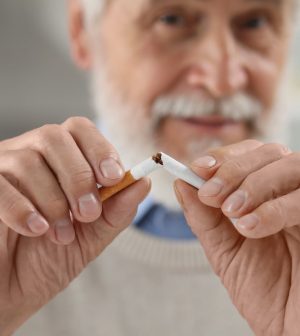- Could Your Grocery Store Meat Be Causing Recurring UTIs?
- Are You Making This Expensive Thermostat Error This Winter?
- Recognizing the Signs of Hypothyroidism
- 10 Strategies to Overcome Insomnia
- Could Artificial Sweeteners Be Aging the Brain Faster?
- Techniques for Soothing Your Nervous System
- Does the Water in Your House Smell Funny? Here’s Why
- Can a Daily Dose of Apple Cider Vinegar Actually Aid Weight Loss?
- 6 Health Beverages That Can Actually Spike Your Blood Sugar
- Treatment Options for Social Anxiety Disorder
Even Hardcore Smokers May Quit If Given Right Tools, Study Finds

Smokers find it easier to quit if they’re automatically offered support, even if they didn’t ask for it, a new clinical trial finds.
Quit rates were higher among health system patients placed in an “opt-out” program, in which tobacco cessation medications and counseling are automatically prescribed upon learning they smoke, researchers found.
It’s called an “opt-out” program because people get the meds and counseling unless they opt out of it.
After a month, 22% of people in an opt-out group had quit smoking, compared with only 16% of smokers who had to opt into the cessation program, researchers reported recently in the journal JAMA Network Open.
“Health care providers don’t ask patients if they would like to get evidence-based care for other conditions like asthma, high blood pressure or diabetes,” said senior researcher Kimber Richter, a professor of population health with the University of Kansas Cancer Center. “They just identify a health condition and provide the best care possible.”
“For no reason, we’ve always treated tobacco dependence differently — we wanted to see what would happen if we proactively treated tobacco dependence,” Richter added in a university news release.
For the clinical trial, nearly 750 smokers receiving medical care from the University of Kansas Health System were asked about their desire to quit, and then randomly placed into one of two groups.
Those assigned to the opt-out group automatically received a starter kit of nicotine patches and gum, a prescription for quit smoking medication, a treatment plan and follow-up calls.
Folks in the opt-out group were free to decline any of these components, but they had to actively decline the offer.
People in the opt-in group were asked whether they’d like any or all of these quit-smoking supports, and only got the components they wanted.
In both groups, people were more likely to successfully quit if they wanted to stop smoking in the first place.
But whether they wanted to quit or not, smokers were more likely to stop if they were automatically provided support rather than having to ask for it, results showed.
For example, opt-out assistance led to successful quitting in about 8% of smokers with absolutely no desire to quit, researchers found. In contrast, 32% of those with a strong desire to stop smoking quit after being plopped into an opt-out program.
Also, the increased benefit from opt-out treatment was the same for all smokers, regardless of their desire to quit, researchers found.
“This study is significant because it shows that proactively providing help without requiring a strong initial desire to quit can still make a big difference,” said lead researcher Byron Gajewski, a professor of biostatistics and data science at the University of Kansas Cancer Center. “It suggests that opt-out treatment could be an effective strategy to help more people quit smoking.”
More information
The National Institutes of Health has more on quitting smoking.
SOURCE: University of Kansas Cancer Center, news release, Sept. 17, 2024
Source: HealthDay
Copyright © 2026 HealthDay. All rights reserved.










